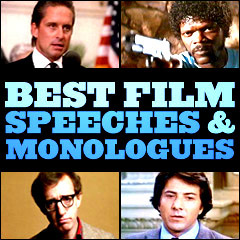|
Best Film Speeches and Monologues
|
|
Title Screen
|
Film Title/Year and Description of Film Speech/Monologue |
Screenshots
|
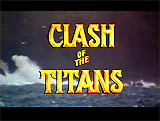
|
Clash of
the Titans (1981)
Screenwriter(s): Beverley Cross
 Immortalized
as Constellations of Stars Immortalized
as Constellations of Stars
One of the legendary Laurence Olivier's last
great monologues, as Zeus decreed that the characters from
the story be immortalized as constellations of stars:
Perseus and Andromeda will be happy together.
Have fine sons...rule wisely...And to perpetuate the story
of his courage, I command that from henceforth, he will
be set among the stars and constellations. He, Perseus,
the lovely Andromeda, the noble Pegasus, and even the vain
Cassiopeia. Let the stars be named after them forever.
As long as man shall walk the Earth and search the night
sky in wonder, they will remember the courage of Perseus
forever. Even if we, the gods, are abandoned or forgotten,
the stars will never fade. Never. They will burn till the
end of the time.
|

|


|
Mad Max 2 (1981, Australia)
(aka The Road Warrior (1982))
Screenwriter(s): Terry Hayes, George Miller, Brian Hannant
 "All
That Remains Are Memories" Opening Voice-Over "All
That Remains Are Memories" Opening Voice-Over
Play clip (excerpt): 
In the voice-over narration (voice by Harold
Baigent) that opened the film, Mad Max was re-introduced,
and the environment was described (with mostly black-and-white
footage from the previous original film, including the murder
of Max's wife and child by a biker gang):
"My life fades, the vision dims.
All that remains are memories. I remember a time of chaos,
ruined dreams, this wasted land. But most of all, I remember
the Road Warrior, the man we called Max. To understand
who he was, you have to go back to another time when
the world was powered by the black fuel and the deserts
sprouted great cities of pipe and steel. Gone now, swept
away. For reasons long forgotten, two mighty warrior
tribes went to war and touched off a blaze which engulfed
them all. Without fuel they were nothing. They'd built
a house of straw. The thundering machines sputtered and
stopped.
Their leaders talked and talked and talked,
but nothing could stem the avalanche. Their world crumbled,
the cities exploded. A whirlwind of looting, a firestorm
of fear. Men began to feed on men. On the roads, it was
a white-line nightmare. Only those mobile enough to scavenge,
brutal enough to pillage, would survive. The gangs took
over the highways, ready to wage war for a tank of juice.
And in this maelstrom of decay, ordinary men were battered
and smashed. Men like Max, the warrior Max. In the roar
of an engine, he lost everything, and became a shell
of a man, a burnt out, desolate man, a man haunted by
the demons of his past. A man who wandered out into the
wasteland. And it was here in this blighted place that
he learned to live again."
|

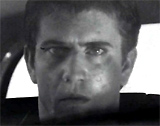



|
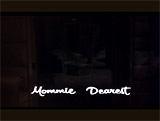
|
Mommie
Dearest (1981)
Screenwriter(s): Robert Getchell, Tracy Hotchner, Frank Perry, Frank
Yablans, Christina Crawford (book)
 "No
Wire Hangers!" Outburst "No
Wire Hangers!" Outburst

Play clips (excerpt):  (short) (short)  (extended) (extended)
Physically-abusive mother and star actress Joan
Crawford's (Faye Dunaway) famous, unintentionally funny but
violent rant to cowering daughter Christina (Mara Hobel) in
her bed, in this cult film classic - before beating her daughter
with one of the hangers:
"No - wire - hangers. What's
wire hangers doing in this closet when I told you - No
wire hangers EVER! I work and work 'til I'm
half-dead, and I hear people saying 'She's getting old.'
And what do I get? A daughter who cares as much
about the beautiful dresses I give her as she cares about
me. What's wire hangers doing in this closet? ANSWER
ME! I buy you beautiful dresses, and you treat them like
they were some dish-rag. You do! $300 dollar dress on
a wire hanger! We'll see how many you've got hidden in
here. We'll see. Get out of that bed. All of this is
coming out. Out! Out! Out. Out. Out. You've got any more?
We're gonna see how many wire hangers you've got in your
closet. Wire hangers! Why? Why? Christina, get out of
that bed. Get out of that bed. You live in the most beautiful
house in Brentwood [picks up hanger and begins to beat
Christina] and you don't care if your clothes
are stretched back from wire hangers. And your room looks
like a two-dollar-a-week priced room in some two-bit
backstreet town in Oklahoma. Get up. Get up. Clean up
this mess."
|



|

|
My Dinner With
Andre (1981)
Screenwriter(s): Wallace Shawn, Andre Gregory
 "Now
I'm 36, and All I Think About is Money" "Now
I'm 36, and All I Think About is Money"
As struggling actor/playwright Wally (Wallace
Shawn as Himself) walked down a NYC street, his voice-over
described:
The life of a playwright is tough. It's not
easy as some people seem to think. You work hard writing
plays and nobody puts them on. You take up other lines
of work to try to make a living. I became an actor, and
people don't hire you. So you just spend your days doing
the errands of your trade. Today I had to be up by ten
in the morning to make some important phone calls. Then
I'd gone to the stationery store to buy envelopes. Then
to the xerox shop. There were dozens of things to do. By
five o'clock, I'd finally made it to the post office and
mailed off several copies of my plays, meanwhile checking
constantly with my answering service to see if my agent
had called with any acting work. In the morning, the mailbox
had just been stuffed with bills! What was I supposed to
do? How was I supposed to pay them? After all, I was already
doing my best! I've lived in this city all my life. I grew
up on the Upper East Side, and when I was 10 years old,
I was rich! I was an aristocrat. Riding around in taxis,
surrounded by comfort, and all I thought about was art
and music. Now I'm 36, and all I think about is money!
Then at the conclusion of the long dinner scene
and its philosophical discussion at a five-star restaurant
between Wally and stage director Andre (Andre Gregory as Himself),
Wally rode home in a taxi, as the film ended:
All the other customers seemed to have left
hours ago. We got the bill, and André paid for our
dinner! I treated myself to a taxi. I rode home through
the city streets. There wasn't a street, there wasn't a
building, that wasn't connected to some memory in my mind.
There, I was buying a suit with my father. There, I was
having an ice cream soda after school. When I finally came
in, Debbie was home from work, and I told her everything
about my dinner with Andre.
|




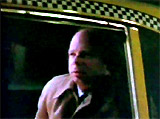
|
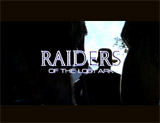
|
Raiders
of the Lost Ark (1981)
Screenwriter(s): Lawrence Kasdan
 "Any
Of You Guys Ever Go to Sunday School?" "Any
Of You Guys Ever Go to Sunday School?"
Multi-talented Professor of Archaeology, "expert
on the occult," adventurer and "obtainer of rare
antiquities"
Indiana Jones (Harrison Ford) spoke to two Army Intelligence
officers: Colonel Musgrove (Don Fellows) and Major Eaton (William
Hootkins) in his college classroom. He explained the significance
of a Nazi Germany digging occurring on the desert outskirts of
Cairo, Egypt in the ancient city of Tanis, the possible resting
place of the Ark of the Covenant - a biblical chest containing
fragments of the 10 Commandments:
The Nazis have discovered Tanis!...The city
of Tanis is one of the possible resting places of the Lost
Ark...Yeah, the Ark of the Covenant. The chest the Hebrews
used to carry around the Ten Commandments...Yes, the actual
Ten Commandments. The original stone tablets that Moses
brought down out of Mount Horeb and smashed, if you believe
in that sort of thing. Any of you guys ever go to Sunday
School?...Oh, look. The Hebrews took the broken pieces
and put 'em in the Ark. And when they settled in Canaan,
they put the Ark in a place called The Temple of Solomon...Where
it stayed for many years. Until, all of a sudden, whoosh,
it's gone...Well, nobody knows where or when.
It was an ominous development that the Nazis
were searching for the Ark, to grant their armies invincibility;
one of Indy's books illustrated the power of the Ark ("lightning,
fire, the power of God or something").
Later that evening
as Indy prepared for his journey for a lost 3,000 year old
object, museum curator Dr. Marcus Brody (Denholm Elliott) warned
about the Ark: "Not something
to be taken lightly. No one knows its secrets. It's like nothing
you've ever gone after before." Indy replied:
Oh, Marcus. What are you tryin' to do, scare
me? I mean, you sound like my mother. We've known each
other for a long time. I don't believe in magic, a lot
of superstitious hocus-pocus. I'm goin' after a find of
incredible historical significance. You're talkin' about
the bogeyman. Besides, you know what a cautious fellow
I am. (He threw a firearm into his suitcase)
|
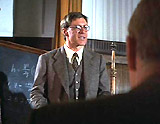
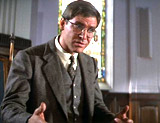
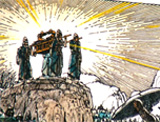
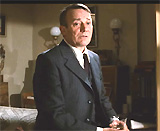
|
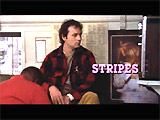
|
Stripes
(1981)
Screenwriter(s): Len Blum, Daniel Goldberg, Harold Ramis
 "We're
All Very Different People...We're Americans...We're Mutants!" "We're
All Very Different People...We're Americans...We're Mutants!"
Under Captain Stillman's (John Larroquette)
threat to repeat basic
training, quick-witted misfit recruit John Winger (Bill Murray)
delivered a rousing speech to motivate his platoon:
Cut it out! Cut it out! Cut it out! (What) The
hell's the matter with you? Stupid! We're all very different
people. We're not Watusi. We're not Spartans. We're Americans,
with a capital 'A', huh? Do you know what that means? Do ya?
That means that our forefathers were kicked out of every decent
country in the world. We are the wretched refuse. We're the
underdog. We're mutts! Here's proof: his nose is cold! But
there's no animal that's more faithful, that's more loyal,
more loveable than the mutt. Who saw 'Old Yeller?' Who
cried when Old Yeller got shot at the end? Nobody cried when
Old Yeller got shot? I'm sure. I cried my eyes out.
So we're all dogfaces. We're all very, very different,
but there is one thing that we all have in common: we were
all stupid enough to enlist in the Army. We're mutants. There's
something wrong with us, something very, very wrong
with us. Something seriously wrong with us! We're soldiers,
but we're American soldiers! We've been kickin' ass for 200
years! We're 10 and 1! Now we don't have to worry about whether
or not we practiced. We don't have to worry about whether Captain
Stillman wants to have us hung. All we have to do is to be
the great American fighting soldier that is inside each one
of us. Now do what I do, and say what I say. And make me proud.
Fall in!
|




|

|
Time Bandits
(1981)
Screenwriter(s): Michael Palin, Terry Gilliam
 Recreating
the World as a Technocracy Recreating
the World as a Technocracy
Evil (David Warner) bragged about how he would
recreate the world as a nightmarish technocracy, if he was
given the chance:
When I have the Map, I will be free, and
the world will be different, because I have understanding...
of digital watches. And soon I shall have understanding
of videocassette recorders and car telephones. And when
I have understanding of them, I shall have understanding
of computers. And when I have understanding of computers, I shall
be the Supreme Being! God isn't interested in technology.
He knows nothing of the potential of the microchip or the
silicon revolution. Look how he spends his time! Forty-three
species of parrots! Nipples for men!... Slugs! He created
slugs. They can't hear! They can't speak! They can't operate
machinery! I mean, are we not in the hands of a lunatic?...
If I were creating a world, I wouldn't mess about with
butterflies and daffodils. I would have started with lasers,
eight o'clock, day one!
|

|
